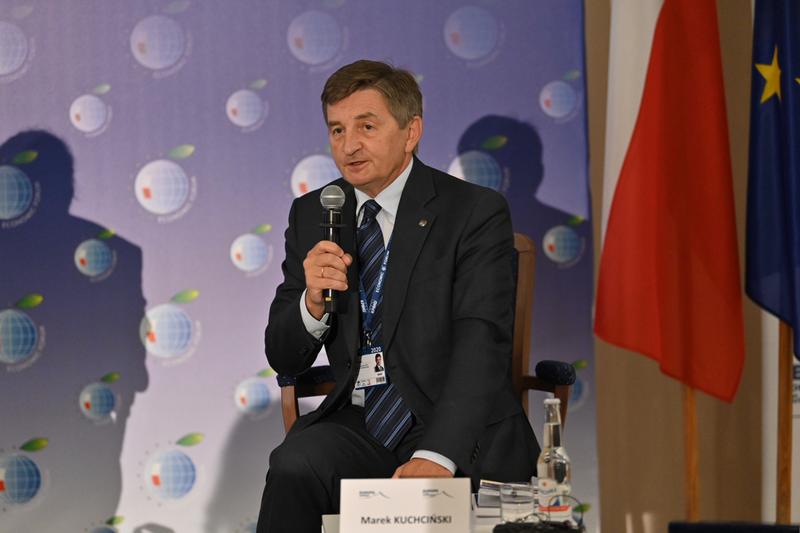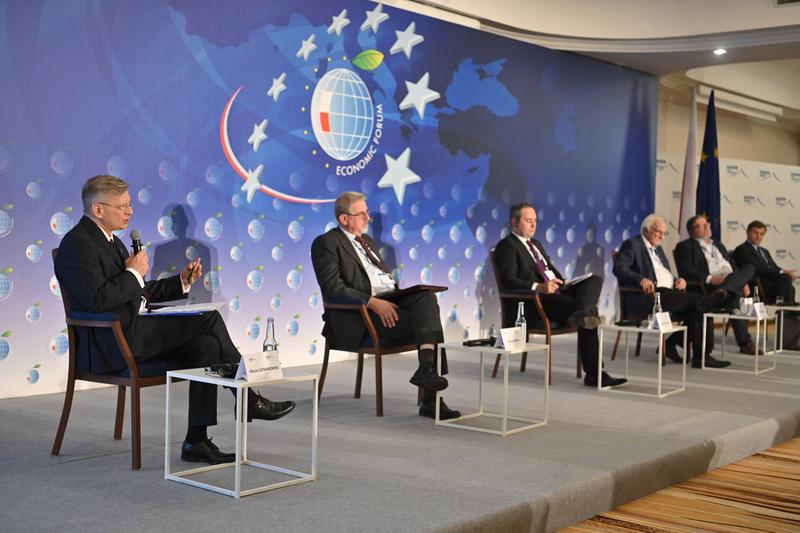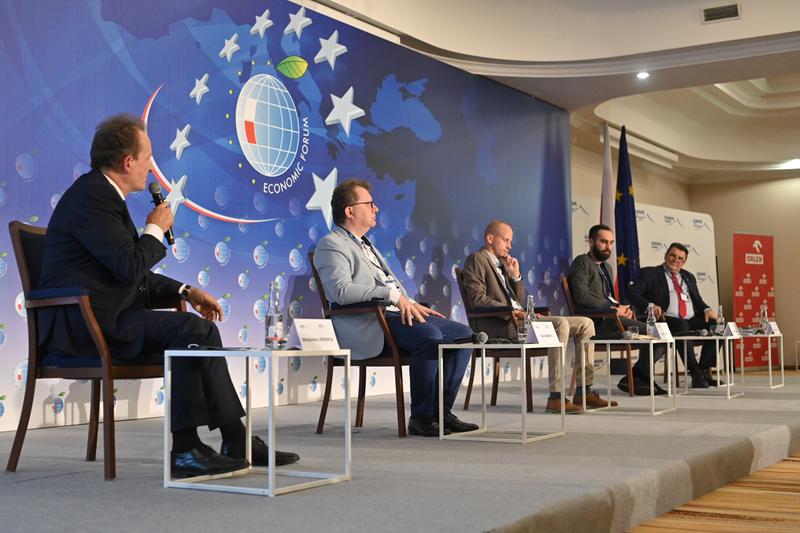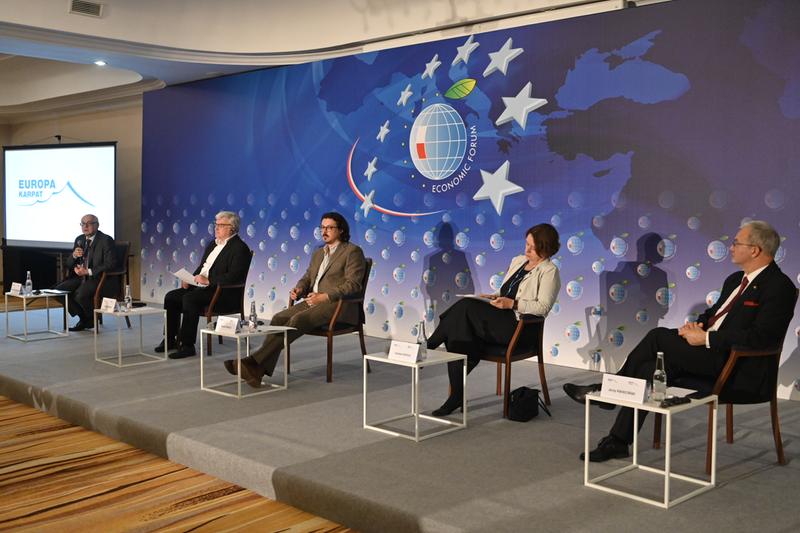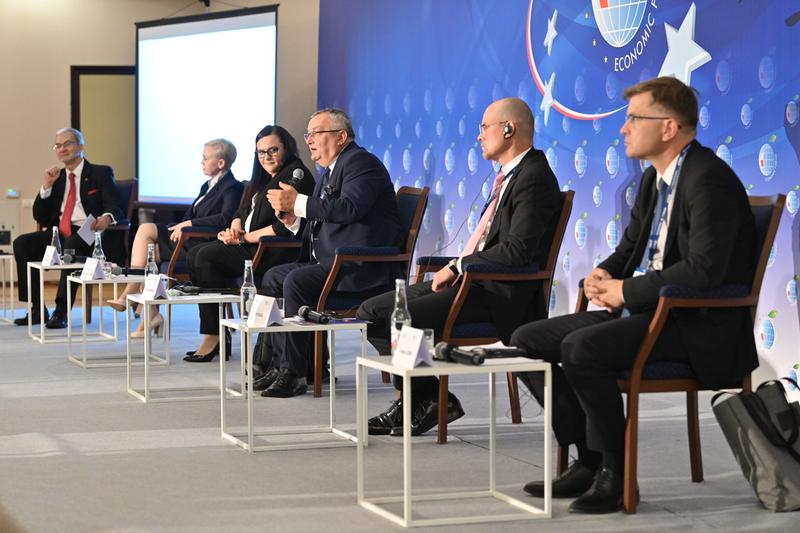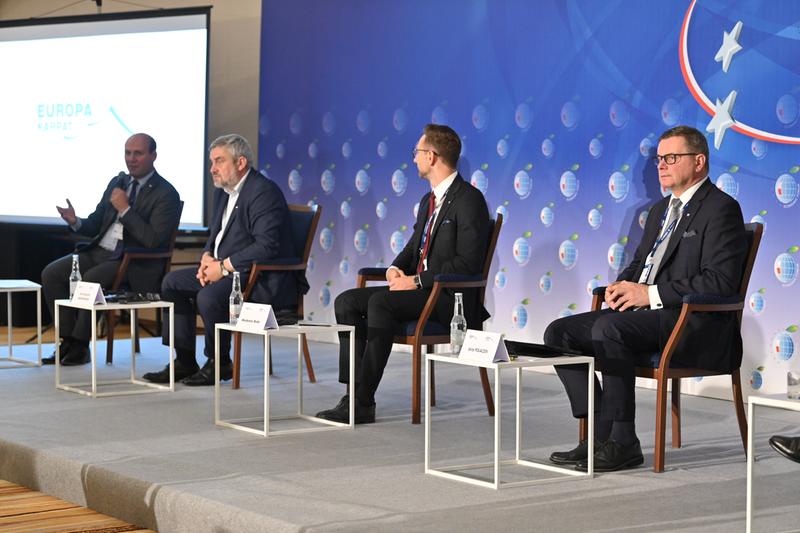The Old Continent is like a young organism. A paradox? Contemporary Europe, due to the EU transformations, has not yet entered the mature age. Although it seemed to us that developed structures give us a rigid framework for development, currently the European community is looking for a new path. It draws inspiration from the past, but reasonable cooperation based, inter alia, on parliamentary diplomacy can lead it into the future. - It is a guarantee of diversity of views, which is a reflection of the will of voters, and it gives a great opportunity for development - argues Marek Kuchciński, creator of the Carpathian Europe and chairman of the Parliamentary Foreign Affairs Committee.
This is already the 27th Europe of the Carpathians conference. This year (8-9 September) it had a special dimension. Not only because it was organized for the first time outside the Carpathians (in Karpacz), but also because at the time of the pandemic we can clearly see how challenging the dialogue between European countries is. We also see more and more clearly that the Old Continent must unite in the face of challenges posed by epidemiological threats and the global migration crisis. How to reconcile the need for economic competitiveness in the face of such powers as the U.S. or China with the diverse economies of Central European countries? Does our continent need a unified voice on the outside or maybe a multi-voice? Tri-Council, Visegrad Group, unification of the Carpathian countries are yet another concept within the internal challenges of our continent. That is why dialogue is so important, which can take place at the governmental, parliamentary and expert levels or combine all these diplomatic means in conferences such as Carpathian Europe. This year's meetings were divided into nine panels.
Panel I: Central Europe in global politics
Professor Maciej Szymanowski, Director of the Wacław Felczak Institute for Polish-Hungarian Cooperation moderated the discussion, which concerned the role and significance of Central Europe in geopolitics. Among the issues discussed were: security issues, transatlantic relations, the significance of the Tri-Cities, and the relations of Central European countries with the biggest players on the international arena - the United States, Russia, Germany, China, Great Britain, and France.
The Deputy Speaker of the Sejm emphasized that the front line and the Iron Curtain ran through Europe. We all experienced communist oppression. It is common for the countries of the region to reorganize their economies, reverse their political and military alliances, and to embrace Western integration. We are chasing the West and are competitive because we are developing much faster, but we are struggling with the problem of mass migration, terrorism, and a rapidly integrating Europe.
It is worth noting the opinion of Alexander Vondra. The Czech member of the European Parliament is one of the initiators of tightening cooperation between the countries of Central and Eastern Europe. According to Vondra, a good place for such a dialogue is the Visegrad Group. - We need an initiative that will balance Germany and Russia. So far our area has paid for their rivalry. Creating a balance within the EU is also a challenge, especially after Brexit. With it, the balance of power in Europe has been disrupted. Previously, we had an axis of France, Germany and the UK in the EU, which stabilized tensions and attempts to impose one vision. After Britain left, this balance was disrupted. Germany is much stronger than France at the moment. So we need a counterbalance, for example the V4 group, but on a larger scale, strengthened by the Tri-City initiative, which will provide a better balance on the North-South axis.
According to Vondra, the essence of the European Union is cooperation, but one can also see rivalry between member states. Meanwhile, cooperation could lead to strengthening the eastern flank. The Baltic countries, Poland and Romania also need a North-South infrastructure, whereas earlier the West-East line was developed. That is why the Carpathian initiative is developing so strongly, although this project needs capital not only from the EU, but also from the USA and Asian countries. It is worth looking at this eastern part of Europe also from the perspective of Russia's aspirations and the need to stabilize the region.
An interesting perspective on the security of our region was presented by the former Minister of Education of Slovakia, Martin Fronc. - We must be ready for conflict. In our countries, compulsory military service has been abolished. Meanwhile, thinking that NATO will defend us puts our vigilance to sleep. This should be changed. We need defence education in schools, and we need to start discussing the return to compulsory military service or another form of preparation for it. The terrorist threat is a civilization problem. In Israel, most terrorist attacks are suppressed by civilians. Europe has so far focused on culture and trade, and we should include a security strategy in it,' Fronc believes.
Panel II: Central Europe: heroes of the century. What do we not know about our neighbors?
The panel on Central European heroes, chaired by Senator Włodzimierz Bernacki, mostly referred to the historical heritage of our region. The panelists pointed to the Christian values that unite the countries of the region, but also to the experiences of World War II and the communist system, which made the concept of freedom especially meaningful for the countries of Central and Eastern Europe.
An interesting counterpoint to the discussion about heroes was provided by Anton Saifullayeu from the Eastern European Studies at Warsaw University. His opinion is all the more important, since Belarus, Saifullayeu's homeland, is currently trembling under the influence of revolution. The scientist from the University of Warsaw claims that authorities should be overthrown. - Today there are no authorities in Belarus. As far as connections with Central Europe are concerned, we can talk about one heroine: Solidarity. After a long break, the time has come when Solidarity appears again in the region and shows its power. The state apparatus does not give strength with solidarity, unity. The current situation in Belarus is not something new. Belarusians have their heroes, their attributes as a nation. However, it is the community that develops most in terms of identity, Saifullayeu argued. At the other extreme is the opinion of Zbigniew Krysiak, President of the Schuman Thought Institute. It is generally accepted that the father of the idea of European community is Robert Schuman. This French politician, born in Luxembourg and educated to a large extent in Germany, wanted a Europe of homelands and a community of nations. - For Robert Schuman patriotism was love of the homeland. This stands in opposition to the current idea of creating a superstate. Loving one's country excludes hating other countries', Zbigniew Krysiak explains. - The longer we live without authorities the more we should be concerned about a certain ticking bomb.
Panel III: Visions of Europe - discussion: Which Europe? Whose Europe?
Professor Zdzisław Krasnodębski, Member of the European Parliament, moderated a panel on the future of the continent and emerging proposals to divide the European Union into a "two or multi-speed Europe" and a counterproposal, which is to be Europe of Fatherlands, or Europe of Solidary States as a confederation of European nation states. Zdzisław Krasnodębski, among others, posed a question about the panelists' attitude towards energy policy. - The accusation is made that Central Europe developed thanks to EU funds and now it is critical. However, it is forgotten that the funds are followed by concessions, such as climate policy - argued the MEP.
Jerzy Kwieciński, President of PGNiG and former Minister of Finance and Development, proposed looking at the European Union not only from the inside from the Polish perspective, but also from the outside. - Despite internal criticism, the EU is an extremely attractive project on the international arena. The EU helped Poland to break free from the legacy of communism, which is evident in the comparison with Belarus or Ukraine. The current crisis will help us reach the Western level and it is likely that we will catch up with Spain and Italy in this decade. Poland was able to take advantage of its opportunity, and I don't just mean the funds. The decisive factor was the management of the state and the economy. The EU was an attractive project for our region. In 1989 Poland and Ukraine had a similar level of GDP per capita, today the difference is sixfold. In our favour.
According to Jerzy Kwieciński Europe has always liked big projects. The European Coal and Steel Community was a success, the European Community was created on its basis. Currently it has lost its lead over the USA, China is also chasing us. The EU was therefore looking for a new great project. This is to be the Plan of Reconstruction, a new great project, long-term, not only economic, but related to a new model of conduct - a project of a "green deal" assuming climate neutrality in 2050. Poland is a part of common actions in this respect.
Professor Krasnodębski noted, however, that not everyone can be optimistic about the effects of changes and Poland's economic success. Moreover, it is not Poland that makes decisions about the energy mix. In the EU, the most important decisions had to be made unanimously. MEP notes that currently there are more and more frequent ideas that more decisions should be made by majority voting. Justyna Schulz, director of the Western Institute explained, that the EU saved the nation states in 50's and 60's. And indeed one can say, that the EU strengthens nation states, but strong and well-organized ones. As for the smaller states, they have failed badly. Greece is an example where important financial decisions were made outside the borders of that country. If one is not well organized and fighting for one's interests, the mere influx of finance does not solve the problems.
David Engels of the Western Institute shows an interesting example of Belgium: - Without the EU, perhaps Belgium would no longer exist at all. Belgian citizens feel protected by the Union and are not afraid of territorial aggression from Germany. Belgians have a positive attitude toward unification, but they are skeptical about what ideologically the European Community is becoming, leftist, greener. So there is a growing anti-EU sentiment, not anti-European.
Panel IV: The Tri-Maritime Investment Fund
The panel led by Jerzy Kwiecinski, CEO of PGNiG and former Minister of Finance and Development, was also extremely interesting. It concerned the created in 2019. Tri-City Investment Fund. It is a tool for implementing projects in priority areas for the countries belonging to this initiative (transport infrastructure, energy sector, digitalization).
According to Małgorzata Jarosińska-Jedynak, Minister of Funds and Regional Policy, the Via Carpatia and Rail Baltica projects are Poland's priority, but what is important for the future of the Tri-Portuguese region is how the funding for the development of infrastructure connections on the North-South axis will look like. Jarosinska-Jedynak emphasized the economic strength of the Tri-Portuguese countries: 80 billion euros in 12 countries were invested in three areas. It is important to develop and maintain supply and service chains. It is important to invest money from different funds. 57 billion may go to Poland as part of a program to rebuild the economy, but also to increase resilience to events such as the Covid pandemic. EUR 66.8 billion under the cohesion policy. The U.S. is also following the development of the Tri-Cities very closely. Also the European Investment Bank (EIB) and the European Bank for Reconstruction and Development (EBRD) can finance part of the investment. I trust that the current restrictions applied by these institutions will not apply to the Fund.
Beata Daszyńska-Muzyczka, President of the Management Board of Bank Gospodarstwa Krajowego explained that at the end of the year we should have at least 5 countries in the Tri-City Investment Fund. The shareholders from Germany, Japan, Australia and the USA are interested. The budget is planned at 3-5 billion euros.
Also Andrzej Adamczyk, Minister of Infrastructure, emphasized the importance of Via Carpathia for the Carpathian region. - Since 2015, there has been a discussion and a return to the legacy of Lech Kaczynski, who then initiated the idea of the transport link known as Via Carpathia. In March 2016, transport ministers of 10 countries sought funding for the project. Currently, Via Carpathia is 8 thousand km of roads. We have secured funds to build the entire section of Via in Poland. It is necessary to create this connection, because it will generate development for the entire region. This is also a hope for Belarus, which will also be able to benefit. Lithuania, Finland, Estonia and Latvia also hope to benefit from this route. There are more countries interested in the project. We submitted an application to include Via Carpathia in the TEN-T core network (Trans-European Transport Network). The project is of great international importance - it will stimulate the economies of the Tricity countries, but it is also of great importance for the Polish economy. An example is the development of Rzeszów, which has become one of the major transport hubs. In 2025 Biała Podlaska will be one of the main transportation routes. At the moment it is one of the most recognizable infrastructure projects in the European Union.
Panel V: Parliamentarians at the service of diplomacy. The phenomenon of parliamentary diplomacy
In a discussion moderated by Bogdan Rzonca, Member of the European Parliament, Prof. Jan Draus recalled the achievements of parliamentary diplomacy, whose importance increased during the 8th term of the Sejm (2015 - 2019). - Parliamentary diplomacy is a phenomenon at the foreign policy level. It has replaced the concept of conference diplomacy. It functions alongside classical diplomacy. The role of individual parliamentarians in the framework of parliamentary assemblies, international associations is very flexible in comparison with classical government diplomacy - this one is hedged with protocol and political instructions. Parliamentarians should complement the foreign policy of their countries. Opposition MPs may have different visions, but their statements do not oblige the government. So it is good to build consensus and focus around it. The 8th term of the Sejm in terms of parliamentary diplomacy has been very active and has not recorded any clashes with the government. The 2015-2019 term has seen parliamentary diplomacy in many formats: mainly V4, Summit of Presidents of Central and Eastern European Parliaments, Carpathian Europe. The University of Rzeszow professor added that when PiS took power, V4 was in crisis. Hence the efforts to rebuild V4 - this was possible thanks to the long-standing parliamentary cooperation between PiS and Fidesz. - Parliamentary diplomacy encouraged a new opening in relations within V4. A huge role in this was played by the speaker of the eighth-term Sejm, Marek Kuchciński. He acted actively and quickly met with the Speaker of the Hungarian National Assembly László Kövér. A new one has grown up on the V4 format in the form of meetings of the Presidents of Central and Eastern European Parliaments. This is a new quality and a very important format that reminds us that Europe is not only the Union. Security issues reach much further. The Carpathian Europe is Marek Kuchciński's own parliamentary concept. I would also like to call for the Carpathian Europe Institute, where this initiative originated. The great role of parliamentary diplomacy is also evident in Polish-Lithuanian relations. Parliamentary relations with Georgia have been raised within the framework of the established Poland-Georgia Parliamentary Group.
Panel VI: Carpathian Europe at the Heart of Central Europe. Review of initiatives
The panel focused on highlighting the strategic importance of the Carpathian Macroregion from the perspective of Central Europe as a whole. At its heart is the Europe of the Carpathians, which is a significant venue for the exchange of ideas that then spills over into the Bucharest Nine, the Tri-Cities Initiative. The Carpathians are proving to be a universal axis around which educational projects are being developed to strengthen security and bridge developmental disparities. Examples of such activities are: Polish-Hungarian School of Leaders, International Forum for Cooperation of Young Carpathians and Tri-Cities, Collegium Carpathicum or Via Culturalia project.
VII panel: The Visegrad Group - towards sustainable development
The discussion about V4 was led by Deputy Minister of Foreign Affairs Szymon Szynkowski vel Sęk, government plenipotentiary for the Polish Presidency of the Visegrad Group. He emphasized that Poland is involved in many regional initiatives which are part of its foreign policy. The most important and most recognizable association in Europe is the Visegrad Group.
Panel VIII: Carpathian Waters
The discussion about hydrological situation of the Carpathian region was moderated by Barbara Bartuś, MP, Chairwoman of the Delegation of the Sejm and Senate to the OSCE Parliamentary Assembly. Małgorzata Golińska, Secretary of State at the Ministry of Environment, Natural Resources and Forestry argued that water is a raison d'etre in Polish conditions. - More than half of the world's water resources begin in the mountains, and the same is true of the Carpathians. The geological structure of the Carpathians does not make it a good area for retention. It is worth realizing that forests are not only a matter of quality, but also of quantity of water and its circulation. Therefore, the great role of forestry. The increase of forested area by about 5% slows down water runoff by 2%. The increase in forest cover in the Carpathians is something to be proud of. Foresters are already implementing programs to help store water on the ground and stop its runoff - explained Małgorzata Golińska.
Panel IX: The third mission of the university 2.0: Cooperation of universities with the external environment during the COVID-19 pandemic
The last panel of the 27th Carpathian Europe Conference was moderated by Jan Malicki from the East European Studies at Warsaw University. The rectors of the Podkarpackie universities talked about university cooperation, which due to circumstances had to go beyond the traditional forms. Jan Malicki also spoke about Collegium Carpathicum: - This project involves 6 universities and we are implementing a grant from the Visegrad Fund. In the spring, we had to accelerate the project and classes had to be conducted online.
